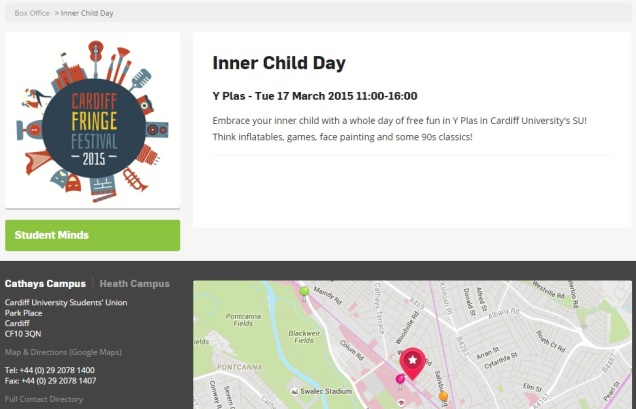
–
Good mental health does not mean regressing back into childhood
One of the most insidious things to emerge from the Cult of Identity Politics taking over Anglo-American university campuses is the false equating of good mental health with a state of childhood.
Safe spaces, campus speech codes and trigger warnings all serve to infantilise students, in the belief that if only these young adults are coddled like children and protected from ever encountering a dissenting opinion or a negative word, it might just be possible to preserve their fragile mental equanimity.
One of the most overt recent manifestations of this trend is the “Inner Child Day” recently held at Cardiff University (the same institution whose students were so traumatised by the hateful presence of Germaine Greer on campus last year).
The ad promoting Inner Child Day encouraged Cardiff students to “embrace your inner child with a whole day of free fun in Y Plas in Cardiff University’s SU! Think inflatables, games, face painting and some 90s classics!”. Because apparently university is no longer a place to emerge into adulthood, but rather place to regress back to the habits and mentality of a toddler.
Johanna Williams paints an excruciating picture of the event in an article in Spiked:
It took place in the nightclub of the students’ union building and featured such mental-health managing strategies as biscuit-decorating, dog-petting, face-painting and jumping about on a bouncy castle. Students were able to work towards the holy grail of positive mental health by practising their forward rolls and uploading pictures of their newly ornamented biscuits to social media in return for the approval of their peers.
The nightclub was suitably decorated. There were balloons everywhere to appeal to the six-year-old children just waiting to burst out of the students’ twentysomething bodies. A giant screen at the front of the room showed a woman cradling a miniaturised version of herself as someone would cradle a child. Apparently, the phrase ‘Can your inner-child come out to play?’ was meant ‘to offer hope to sufferers’.
Watching this event unfold was like walking into a perverse version of Alice in Wonderland. Twentysomething adults were catapulting themselves towards a healthier state of mind on the bouncy castle with an abandon that would get them banned from any normal event involving bouncy castles.
This all sounds disturbingly similar to the Safe Space room set aside during a debate at Brown University in Rhode Island, in which students who felt “triggered” by what they heard during a voluntarily attended meeting were offered infantilising consolations such as puppy videos, snacks, soft furnishings and Play Doh, as well as an army of trained counsellors.
Williams concludes:
This attempt to fight insanity with insanity is worrying. The trend towards medicalising everyday moods, to treat, say, the homesick student as someone with a mental-health problem, has led to the creation of a bogus epidemic of mental ill-health on campus. This means that people who suffer from a genuine mental illness, such as schizophrenia, are missing out on support because too much attention is focused elsewhere.
These childish events will do nothing to help students who are genuinely unwell. What’s worse, they’ll make today’s pampered students even less likely to grow up.
Williams is right. This is dangerous stuff, inflating good mental health with a regression to a sanitised version of childhood, with face painting and cookies and puppy dog videos. And whatever transitory benefit it may provide to students who are not really mentally ill but are simply stressed or homesick, it will do nothing for – and in fact diverts attention and resources away from – the far smaller number who are genuinely in need of help.
True mental health comes about by building a healthy resilience to the kind of everyday emotional bumps and scrapes which characterise adult life. In the real world, people sometimes have completely contradictory views about fundamental issues, but must nonetheless live, shop and work together.
Safe space policy makes that harder by sending the message that students should not have to so much as glimpse opposing ideas, while the entire cult of Identity Politics is built on the notion of a backbiting Hierarchy of Privilege, where everybody is an oppressor and nearly everyone (except for cis white men at the top of the pyramid) is also oppressed.
This culture does not produce resilient, well-rounded adults. Rather, it is producing a generation of self-involved, narcissistic adult babies who worship at the altar of their chosen “identity” and demand that everybody else admire their idiosyncrasies, acknowledge their pain and massage their egos on pain of censorship or disciplinary action.
And if none of that stirs you to anger, then at least be outraged by Cardiff University Student Union’s cynical, tawdry trivialisation of mental health, and the suggestion that ten minutes on a bouncy castle and a spot of face painting are the cure for those students who suffer from genuine mental health issues.

–
Agree with this article? Violently disagree? Scroll down to leave a comment.
Follow Semi-Partisan Politics on Twitter, Facebook and Medium.
